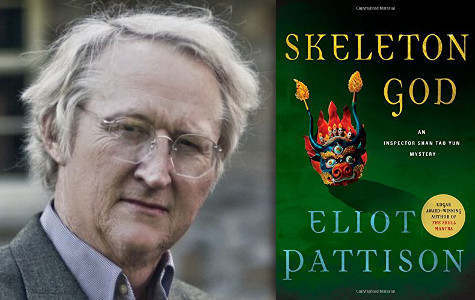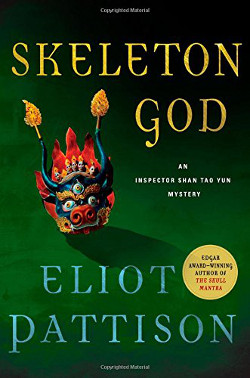
Eliot Pattison is an American international lawyer and award-winning author. His first book in the Inspector Shan Tao Yun series, The Skull Mantra, won the 2000 Edgar Award for Best First Novel. His latest, Skeleton God (available March 14, 2017), is the ninth Inspector Shan mystery.
Recently, Mr. Pattison took time out of his busy schedule to answer some of CrimeHQ's questions about his legal background, his writing influences, and his latest Inspector Shan novel!
What, if any, influence has your law training had on your writing?
A surprising number of enduring writers have started out with a legal education. To be a good lawyer you must be a good communicator; successful advocacy drives concise, deliberate articulation of ideas that follow established rules of grammar and structure. That is a great foundation for anyone who is serious about using the English language in more creative ways. It also makes for all the more satisfaction when, as a fiction writer, you find ways to effectively communicate while disregarding those strict rules.
What are you currently reading?
I am always reading at least two books at once, usually one fiction and one nonfiction. My current nonfiction is actually an audio course on ancient Judaism (I’m a Gentile with an aggressive curiosity, piqued by living several months on a Israeli kibbutz), and I’m also reading an historical novel by Bernard Cornwell. Good books, whether fact or fiction, are storehouses of great ideas, and I love the often unexpected cross-fertilization of ideas that occurs when two books are read side by side.
What do you want readers to think or feel after finishing this book?
If a reader is still thinking about one of my books hours or days after putting it down, I have accomplished my most important goal. I want my readers to linger with new perspectives on the facts and human truths of a very different, often wrenching reality that exists elsewhere on our planet. I want them to inhabit my story in their own way, to engage with my characters as if they were personal acquaintances and then contemplate the effects of the blurred morality of the world we have created.

Describe Skeleton God in five words or less.
Impossible justice, achieved.
What pushed you to move from writing successful nonfiction to mysteries? Did you always aspire to be a novelist?
After experiencing so much of the world—a million air miles on five continents—I discovered that I had messages inside me that could never be conveyed in nonfiction. I had entertained the notion of writing fiction ever since my university days, but it was that seasoning of other cultures, that accumulation of other perspectives, that made my fiction possible.
What is the biggest challenge you face in the writing process?
My biggest challenge in the writing process is maintaining the discipline to write every day despite the many other necessities of my life. My biggest creative challenge is the first paragraph of a novel. It can take me weeks to create an opening paragraph I am satisfied with, but by then that paragraph resolves the rest of the book for me.
Given the international and mythical elements of your novels, what is your research process like before starting to write?
My research started at the age of eight when I would lie down in the fragrant alfalfa field on our Maryland farm and gaze up at the passing clouds. In terms of factual research, I write about places and times that I have studied for many years, so I have stored up a lot of knowledge—but I always build on that base knowledge. With every new book, I identify a new aspect—a certain period of Chinese history, Tibetan medicine, etc.—which will require me to conduct more research. I want to grow as my readers grow in their own knowledge of my worlds. My favorite sources, which I actively seek, are firsthand eyewitness accounts: I will always prefer the personal observations of someone who experienced Tibetan medicine, for example, over a treatise on the topic.
How has Inspector Shan changed over the course of the series?
Shan has gained more confidence in his defiance of institutions—sometimes even recklessly so. When my readers first met him he was a gulag prisoner, weakened and vulnerable in every aspect but his spirit. Today—partly because of his confidence in playing Beijing’s systems, and partly because of his conviction that he must always do the fair and virtuous thing no matter what the cost—he can more aggressively seek the truth.
What would be your murder weapon of choice?
A Buddhist curse.
My plots don’t hinge on exotic weapons—no blades of ice or dart frog poisons in my pages—but rather on subtle interplays of motive and character. My weapons are mere tools; it is the way and why of how they are used that lies at the heart of my books.
What mystery writers have had the biggest impact on your career?
I have never dwelt much on the lines between different genres. For me every good novel has a mystery at its core. I love writing what would be traditionally labeled mysteries, but the writers who have most deeply impressed me through the years have crossed over genre lines, including Umberto Eco, Martin Cruz Smith, John le Carré, Patrick O’Brian, and Edgar Allan Poe.
How would you encourage your readers to become interested in the Tibetan cause?
The Tibetan cause is a multifaceted, multimedia phenomenon, which offers many points of engagement. Touching base with one of the active organized efforts like the International Campaign for Tibet or Tibet House (there are numerous local groups, as well) is a great place to start. Opportunities abound for letter writing, donations, lobbying, fundraising, and direct aid to Tibetan refugees. One of the most effective actions is direct intervention with congressional representatives, several of whom have raised important voices on behalf of Tibet.
Read an excerpt from Skeleton God!
To learn more or order a copy, visit:
opens in a new window![]() opens in a new window
opens in a new window![]()
Eliot Pattison is the Edgar Award-winning author of the Shan novels, including The Skull Mantra and Soul of the Fire. A frequent visitor to China, his books and articles on international policy issues have been published around the world. He lives in Oley, Pennsylvania.

I would love to read the book.
This sounds interesting and thought provoking. I would like to read it.
Sounds like a book I will enjoy
Looks interesting .
A fascinating author and a most interesting and informative interview. Thanks for this feature and giveaway.
A mystery and learning of different culture. What could be better?
Sound like a great read!
Sound like a great read!
Great interview! I’m looking forward to this next Inspector Shan book!!!
The novel does a great service if it makes more people aware of the cause of the people of Tibet.
I’d love to read this book
cool
A brand new series for me, I’m intrigued. Thanks for the chance to win.
Good interview. I want to read this.
This is no. 1 on my TBR list.
He is a new author to me. I shall look for his books. I enjoyed reading the answers given in the Q & A section.
How fascinating it sounds and what a great interview! Thank you for the chance to own a copy.
[b]Ooooo, I was hoping you’d have a giveaway for this book. I love the Shan novels. OMG. I’m so ready to read this one. Mr. Pattison talks about his most important goal? KUDOS, Sir. You have indeed done this over and over. I enjoyed the excerpt. Of course it left me wanting more. [/b]
[b]PS> I love when Bernard Cornwell wishes me a ‘Happy Birthday’ in Facebook. 🙂 [/b]
It really does sound fascinating.
It really does sound fascinating.
This would be my first book by this author.